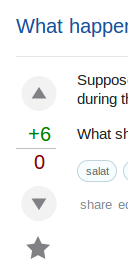Everybody can vote. Although the site encourages upvoting by quality, users may not follow this.
Everybody can vote once per post. I look forward to the point when we have a group of dedicated up-voters (maybe only 5 users) who:
know to vote up quality posts, while having realistic expectations about quality, and
actually do it.
Once we effectively guarantee that effortful posts are consistently getting 5+ score, it will be worth people's time to put in that effort into their posts. The more we upvote high-quality posts, the more we encourage high-quality posts.
I think a small number of upvotes for medicore posts is not that bad either:
- it's welcoming, which may encourage further posting, and over time a user's posts tend to improve [to get from A to Z we must go through B, C, ..., Y],
- we need people with enough reputation to moderate the site [notably, voting to close], and
- they're just Internet points.
Recently, I've seen low-quality posts be ignored (for newer users) or downvoted (for users who should know better), which is pretty much as it should be. [Along with flags, votes to close, etc., where appropriate.] The participants are not drawing attention to low-quality posts, which is great: poor answers fall into an "answer graveyard" at the bottom of the page, and poor questions are subject to automatic deletion.
It is unlikely but possible that some answers have a very wrong viewpoint in controversial topics, but somehow they were upvoted because.. Well, the nafs wants it to be true. Of course, there would be other answers which corrects the other answer.
This is a problem about voting in general. We just do the best we can, and hopefully it's rare.
My suggestion is that: We should see both upvotes and downvotes on a question rather than a score of up minus down votes. So, a user would understand whether the answer is [controversial] or not.
That feature is available with the established user privilege (i.e., 750+ reputation during beta). See:

Side question: Do you think this site is reliable for a muslim? (I don't know if reliable is the correct word here)
In short, if an answer is not backed up, it's value is equal to the guess of a random person on the Internet. If it is backed up, then its reliability is affected by the reliability of the references.
However, Islam.SE seems to give more impartial answers than individual scholars:
My school is right: Scholars have specific biases, particularly towards their favored school of thought.
I am right: Judging from online fatawa, scholars might also answer a question with a simple "this is wrong; I said so" (appeal to authority), rather than explain why it is wrong and have their reasoning be critiqued.
Other opinions are wrong: Scholars often don't acknowledge when there's a difference of opinion.
So I feel it's easy for the value of Islam.SE to be overlooked.

